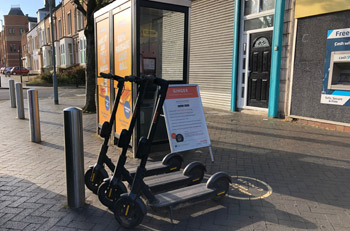MPs have given qualified backing to the legalisation of electric scooters, including privately owned ones, but warned that this should not be to the detriment of pedestrians.
In a report published today, E-scooters: pavement nuisance or transport innovation, the Transport Select Committee says that e-scooters have the potential to offer a low cost, accessible and environmentally friendly alternative to the private car.

Ginger e-scooters on trial in Middlesbrough
However, while generally supporting the use of e-scooters, MPs have said that current rental trials and any plans for legalisation should not be to the detriment of pedestrians, particularly disabled people.
The committee is calling for robust enforcement measures to eliminate the pavement use of e-scooters, which the report says is dangerous and anti-social.
It says that if the Government decides to legalise privately owned e-scooters, the law should clearly prohibit their use on pavements and ensure that such enforcement measures are effective.
Further caveats in the report include calling for ‘a sensible and proportionate regulatory framework for the legal use of electric scooters, based firmly on evidence gained from current rental trials and from other countries’.
It says these trials should allow important evidence and data to determine the best way to legally incorporate both rental and privately owned e-scooters within the UK’s transport mix.
In addition, the report says the Department for Transport must encourage the use of e-scooters as a replacement short car journeys, rather than walking and cycling, warning, that it would be counter-productive if an uptake in e-scooters primarily replaced more active and healthy forms of travel.
Committee chair Huw Merriman said: ‘e-scooters have the potential to become an exciting and ingenious way to navigate our streets and get from place to place. If this gets people out of the car, reducing congestion and exercising in the open air, then even better.
‘We heard first-hand about the impact of e-scooters on pavements. We need to ensure that their arrival on our streets doesn’t make life more difficult for pedestrians, and especially disabled people.
‘Before proceeding with plans to legalise the use of e-scooters, local authorities and government must use the trials to monitor this closely, put enforcement measures in place and ensure they are effective in eliminating this behaviour.’
The RAC’s head of roads policy, Nicholas Lyes, said that while e-scooters have the potential to transform how many of us get around, ‘the path to introducing them safely is fraught with difficulties’.
He added: ‘From ensuring limited road space can be safely shared by drivers, cyclists and now e-scooter riders, right through to how to minimising the chances of them being used on pavements, there is a great deal for national and local government, as well as police forces, to work through.
‘There is also a good argument for ensuring there is sufficient segregated cycle/scooter-ways built to reduce the amount of conflict between these new forms of transport and existing road traffic.’
The report makes a number of recommendations:
- If the Government legalises e-scooters, users should not be required to have a driving licence for either rental or private use.
- The Department for Transport should monitor the number and types of collisions during the trials to determine future insurance requirements for rental and privately owned e-scooters.
- Local authorities should determine the speed of e-scooters in their areas.
- The DfT should use the data from the trials to determine which e-scooter design requirements are appropriate for UK roads.
- Helmet use should be encouraged for rental and privately owned e-scooters.
- The DFT along with local authorities should monitor the trials for problems emerging with abandoned e-scooters leading to ‘street clutter’.
- With 'valid' environmental concerns relating to the lifetime of the scooters and the processes used to recharge their batteries, the DfT should closely monitor the environmental impact of e-scooters and consider introducing stricter requirements around sustainability if needed.